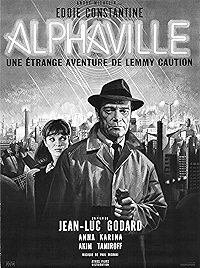The French New Wave, film noir and sci-fi all collide in Alphaville, Jean-Luc Godard’s mad mash-up of all three genres. If it does nothing else it demonstrates that as long as you have imagination you don’t need any budget at all to make an impressive movie.
Godard shot it all in Paris, with no sets, no gadgety props, no special effects. He didn’t even bother with a newly minted character. Instead he repurposed Lemmy Caution, a gumshoe created by British crime novelist Peter Cheyney who had already appeared in a string of French B movies by the time Alphaville came out in 1965.
Then, as here, Caution is played by the American singer Eddie Constantine, whose honeyed-gravel voice and watchful performance make him an ideal stand-in for the likes of Humphrey Bogart.
Caution is a secret agent, code number 003, who has just arrived on Earth from the Outlands. Posing as journalist Ivan Johnson, he is trying to track down a certain Professor Von Braun, but instead comes across his daughter, Natacha (Anna Karina), a young woman who, like almost everyone on this planet, seems to be in a state of hypnotised servility. Meanwhile, an all-seeing and possibly all-knowing artificial intelligence called Alpha 60 seems to run everything and makes regular gargled pronouncements on events, most of them gnomic, all of them ignored by Caution as he goes about his mission.
The private-eye’s task is to find the professor, and quite possibly get the girl en route, all the while avoiding a run-in with Alpha 60, who almost certainly knows what Caution is about, since it seems to know everything else.
Constantine dresses like a private eye from the 1940s in trenchcoat and hat. He smokes and drinks whisky. To re-emphasise what he’s up to, Godard got in Paul Misraki – who scored a number of the other Lemmy Caution films – to add a soundtrack of brassy honks and dramatic strings to his updated noirish tale. He’s deliberately ramming genre conventions and expectations together to see what happens when the past and future collide, and pretty much inventing the dystopian retro-futurist genre that would become so influential in the following decades. See Blade Runner for further details.
Godard uses modernist buildings a lot to suggest the future, deploys crash edits from the French New Wave playbook, adds flashing-light cutaways to build a rhythm which Constantine’s world-weary performance starkly contradicts. Raoul Coutard, one of the creators of the New Wave style (he shot Breathless, Bande à Part and Shoot the Piano Player), films it all in a crisp monochrome – crisp to suggest the modern, monochrome for the old.
All this style to one side, not an awful lot goes on for much of the film’s 100 minutes, though Godard’s technique and stylistics keep us hooked while the editing by Godard regular Agnès Guillemot gives it enough fizz to sustain it to the finale, when there’s a sudden outburst of action – corridors negotiated at speed, bullets fired, cars chasing each other down the slushy streets.
Freedom is its overarching concern and this explosion of late action is the cinematic proof that some has been found. Reinforced by the final scene between Natacha and the detective, in which she overcomes the brainwashing to utter the words he’s been longing to hear.
It’s a genuinely novel movie, which time has robbed of some of its shock value, and yet it endures as iconic because of its sheer vitality and the inventive visual choices Godard is making for almost every second of its running time. It was a big hit, for Godard at least. For Constantine, not so much. The producers of the Lemmy Caution movies were appalled at how “their” character had been subverted and Constantine was dropped as their star. He didn’t make another appearance as Caution until the 1980s.
Alphaville – Watch it/buy it at Amazon
I am an Amazon affiliate
© Steve Morrissey 2024


